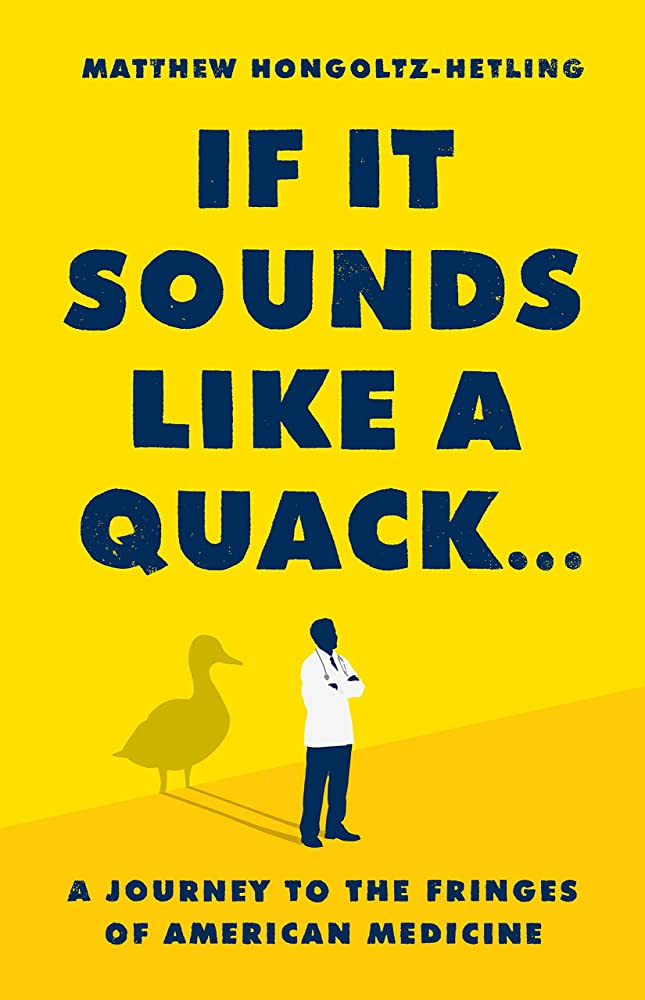What to Read Next (No. 275): Faith, Science, and Medicine
Quack doctors and brain researchers.
Happy Friday, readers!
By sheer happenstance, I’ve read a number of books recently that delve into the fields of medicine and science. One is a new title from an author I really enjoy, one was for book club, one was inspired by a mortician. . . the ways that books get into our hands is always fun to think about, and then it’s even more of a delight when we find connections between those books.
Today, I’m sharing one non-fiction dive into quack medicine and one introspective novel that attempts to get to the heart of finding meaning in life.
Let’s jump right to it.
Upgrade to a paid subscription to support this newsletter and the full text of my weekly “This & That” feature, which has links, lists, ideas, recommendations, and more:
If It Sounds Like a Quack. . .: A Journey to the Fringes of American Medicine by Matthew Hongoltz-Hetling
Matthew Hongoltz-Hetling’s first book, A Libertarian Walks Into a Bear, was a hit with our book club. He gave us a lot of humor and a lot of empathy, while also telling an incredibly compelling and entertaining story.
His second book, which captures the absurdities of America’s medical freedom movement, does all those same things in an even tighter and more creatively told narrative.
Starting in the 1970s and taking us all the way through the current moment, MHH profiles a handful of seemingly ordinary people who turned downright bizarre in the name of science and medicine — but with no actual science backing them up.
Larry Lytle made medical lasers. Toby McAdam bills himself (still) as a “master herbalist.” Jim Humble concocted the Miracle Mineral Solution, which is basically bleach. There’s even an appearance by an extraterrestrial.
Inevitably, the story takes a more serious, political turn once we get to COVID. Medical conspiracy theorists have run rampant in the last few years, helped in no small part by internet algorithms that surface the most extreme and bizarre content. In turn, this creates an atmosphere where unscientific claims appear to have broader support than they actually do, which sadly then leads to growing numbers of real supporters for those unfounded beliefs.
Funny when he can be, earnest and serious when he needs to be, Hongoltz-Hetling brings us on a roller coaster journey through the last 50 years of a libertarian subculture that has grown by leaps and bounds.
I highly recommend If It Sounds Like a Quack. . . to all types of readers. MHH is one of the most clever writers I’ve ever encountered, period. Even if you don’t read much non-fiction, this is one to grab from the bookstore or library.
Transcendent Kingdom by Yaa Gyasi
Yaa Gyasi’s breakout debut novel, Homegoing, was one of the very first titles our book club read. In early 2017, our group universally enjoyed her moving multi-generational story.
So I wasn’t too surprised when our group recently voted to read Gyasi’s second novel, Transcendent Kingdom, here in April.
There were some familiar themes — a Ghanaian family looking to find their place in the American South — but this story was certainly different from Homegoing, both in its pacing and style.
Gifty, our main character, is a neuroscience student at Stanford. She’s studying addictive behaviors in mice, an area of research that stems back to her brother’s overdose. On top of that, Gifty’s mom is bedridden by depression. In the midst of this trauma and heartache, she’s trying to figure out the point of it all.
She’s pulled between finding that meaning in faith or in science/reason. As for many of us in this complicated world, neither framing is 100% satisfying.
For the most part, our club enjoyed the book, giving it between 3 and 4.5 stars. There were some legitimate critiques, but as always, the discussion was lively and we all came away with a deeper, richer connection to the book.
Personally, I gave it 4 stars. Though I didn’t find the story to be as memorable as Homegoing, Gyasi is an immensely gifted writer and Transcendent Kingdom offered a readable, thought-provoking narrative.
P.S. For the paired cocktail — something I try to do for our book club discussions — I went with the Alabama Slammer. It’s a somewhat strange and syrupy concoction made from Southern Comfort, Amaretto, Sloe gin, and orange juice. I didn’t mind it, but most of the group preferred the fruity G&T that was available as a backup.
Thanks so much for reading! I deeply appreciate the time and inbox space.
-Jeremy



